- Home
- M. K. Hume
The Emperor's Blood (e-novella)
The Emperor's Blood (e-novella) Read online
Copyright © 2015 M. K. Hume
Extra material (Prologue and Chapter I of The Blood of Kings) Copyright © 2015 M. K. Hume
The right of M. K. Hume to be identified as the Author of the Work has been asserted by her in accordance with the Copyright, Designs and Patents Act 1988.
First published as an ebook in 2015 by HEADLINE REVIEW
An imprint of HEADLINE PUBLISHING GROUP
Apart from any use permitted under UK copyright law, this publication may only be reproduced, stored, or transmitted, in any form, or by any means, with prior permission in writing of the publishers or, in the case of reprographic production, in accordance with the terms of licences issued by the Copyright Licensing Agency.
All characters in this publication – apart from the obvious historical figures – are fictitious and any resemblance to real persons, living or dead, is purely coincidental.
Cataloguing in Publication Data is available from the British Library
Ebook conversion by Avon DataSet Ltd, Bidford-on-Avon, Warwickshire
eISBN: 978 1 4722 1590 1
Cover photo © Stephen Mulcahey/Alamy Stock Photo
HEADLINE PUBLISHING GROUP
An Hachette UK Company
Carmelite House
50 Victoria Embankment
London EC4Y 0DZ
www.headline.co.uk
www.hachette.co.uk
Contents
Title Page
Copyright Page
About the Author
Also by M. K. Hume
About the Book
Map – Maximus’s Pursuit of Emperor Gratian
The Emperor’s Blood
A taste of The Blood of Kings
Don’t miss M. K. Hume’s other magnificent novels
About the Author
M. K. Hume is a retired academic, who is married with two grown-up sons and lives in Queensland, Australia. Having completed an MA and PhD in Arthurian Literature many years ago, M. K. Hume has now written a series of magnificent novels about the legend of King Arthur. For more information visit: www.mkhume.com.
By M. K. Hume and available from Headline Review
King Arthur Trilogy
Dragon’s Child
Warrior of the West
The Bloody Cup
Prophecy Trilogy
Clash of Kings
Death of an Empire
Web of Deceit
Twilight of the Celts Trilogy
The Last Dragon
The Storm Lord
The Ice King
Stormbringer’s Voyage (e-novella)
The Last Dragon’s Voyage (e-short story)
Tintagel Trilogy
The Blood of Kings
The Emperor’s Blood (exclusive e-novella)
About the Book
A gripping e-novella that brings the dramatic battle between the High King of Briton, Magnus Maximus, and the Roman Emperor, Gratian, vividly to life.
In the dying days of Roman rule, Magnus Maximus casts his eyes on the throne of the Western Empire and with a band of brave Roman and British warriors he marches to Gaul and challenges the might of Rome itself . . .
CHAPTER I
Hunting
Even if strength (should) fail, boldness at least will deserve praise:
in great endeavours even to have had the will is enough.
Propertius, Elegies, Bk 2
Yellow dust swirled over the dry road. A small troop of Roman cavalry was abroad, so farmers hurried their families into their tiny houses and prayed that their livestock would be left alive to help them survive through the next winter. Across the smoke-filled horizon in the north-west, fires sent charcoal scars across the blue afternoon sky. Whispers and rumours had travelled on the wind that the emperor had fought a great battle . . . and had lost. Although one emperor was much like another, the bravest crofter shivered at the thought of a disaster such as this defeat. What suffering would filter down to them, their children and their fields? These great men fought for power, a throne, or family glory, but the farmers knew the real cost of war all too painfully, for they had paid levies that took away their sons. Oh, yes, they knew very well that it takes sixteen years for a child to grow into a man, for their sons had died, again and again, for the glory of empire.
The lead horse of the small group of riders was a showy roan whose coat had gleamed from many hours of brushing but in the afternoon sunlight, the dust-covered beast seemed to have been dipped in drying blood. The man who rode it was conserving its energy with a dexterous use of reins and heels. Under his billowing red cloak, he was also streaked with sanguine. Gore had seeped into his mailed gloves to clog the fine mesh and coagulate thickly so that the pliant metal appeared slick, almost glossy. No part of this Roman’s armour had been cleansed, except for the sword that had been placed in its scabbard after it had been cleaned and sharpened with meticulous concern for its future use. All loyal soldiers obey urgent orders from their king without delay, and will defer washing body armour and their own flesh after a battle, but weapons must be tended with the loving care given to a beautiful woman, because a gladius could mean the difference between life and death.
Andragathius, Captain of Flavius Magnus Maximus’s cataphractarii and slavish servant of his master’s smallest desires, was abroad on his master’s business.
The heavily armed men who rode in his wake were no cleaner. Stern-faced and desperate, they searched for the spoor of their quarry with the stoic determination of men who were prepared to give their all to the requirements of their commander. When Maximus ordered, no man dared to refuse. When Maximus asked, no man chose to ignore his requests.
The battle had barely concluded, but Emperor Gratian had fled the field and abandoned his troops to their fate. Then Maximus had called Andragathius, Conanus and Crucius to his leather tent. The king had complete faith in the ability of his field commanders to demolish the remnants of Gratian’s army, so he had retired to his headquarters to begin the next phase of his carefully crafted plans.
The three men had entered their master’s presence with due deference and some embarrassment, because they were stinking from the reek of battle and their exposure to blood, intestines, sweat and fear. The Ordovice Briton, Conanus, who was Maximus’s brother-in-law, had slouched down into a folding campaign chair and was leaning backward to ease his aches and pains. He had nonchalantly raised his long legs and filthy, booted feet on to a small stool. Maximus stared at the cracked leather boots streaked liberally with mud and other, less savoury stains with an expression that was largely unreadable. Andragathius kept his gaze down at his own dirty sandals as he waited for his adored master to express his desires.
Maximus had been in the thick of the fighting and, although he had removed his armour and washed his hands and face, his efforts had been hurried as he called for his most trusted commanders. Blood had dried in brown crescents under his fingernails, in a rime along his hairline and in a faint spray that could be seen on any skin that had been unprotected by his body armour. A fine goblet of rock crystal, worth a king’s ransom, had been placed on the table beside his campaign chair. The wine within it was so rich that a shaft of afternoon light caught the cup and set the crystal and wine glowing with the colour of incandescent ruby.
Maximus cleared his throat of its accumulated dust and phlegm. His leonine head, his close-cropped hair and his startlingly dark eyes were hooded with secret plots. He had won the first game on the board, but his quarry had managed to escape. H
e needed Gratian’s corpse, and he needed it urgently. For Maximus to achieve his ambition to wear the laurel wreath for which he hungered, Gratian must die. Then, straight as a Scythian arrow, Maximus’s path to the Palatine and the mother of the Empire would be open before him.
The commander raised his piercing eyes to survey his lieutenants.
‘I have a task that must be carried out, gentlemen, one that is vital to the success of our entire campaign. Emperor Gratian must be stopped and put to the sword before he reaches his reinforcements at Mediolanum. He has headed in a southerly direction with his loyal officers, but I have no doubts that he’ll turn to the east as soon as he feels safe to change direction. Gratian must be stopped, Andragathius, at all cost.’
Andragathius nodded predictably, as if Maximus’s smallest order was sufficient, but Conanus put both feet down on to the coarse canvas floor and spoke his mind.
‘Gratian will be heavily protected. We’ll only have a force of some ten men each, brother, if we intend to travel hard and fast. We might isolate the emperor and achieve our mission, but it will be difficult to return with the good news. We’ll need to devise a realistic plan to ensure our escape after we put Gratian to the sword.’
A vague shape coughed in the darkest corner of the tent where a young Briton was sitting at a folding desk, taking notes on scrolls that had been prepared for use.
‘Yes, Aeron? You have something useful to add to my plans?’ Maximus turned his head to direct his hard eyes at the slender youth who was responsible for recording details of the campaigns waged by Maximus, who was the Roman commander and High King of the Britons by dint of his marriage to Elen, Queen of the Ordovice tribe.
‘Aye, sire. Gratian’s Roman centuries have surrendered to you after the emperor deserted them in such a cowardly fashion. They have no love for their erstwhile commander, a man who has indicated in the past that he holds his Alan warriors in higher favour than the true soldiers of Rome. The Romans swore allegiance to you because they have grown weary of being passed over for promotion or humiliated by Gratian’s obvious favouritism. They have sworn to follow you to the throne, haven’t they?’
‘Aye!’ Maximus replied drily, but Aeron continued with his fervent explanation.
‘I believe that Gratian’s guardsmen will also desert him when they are confronted with the appropriate situation. Only the Alans continue to fight and, even now, our troops are being forced to destroy them, man by man, because the Alans will always refuse to surrender. But Romans are a different matter, so Gratian’s own foolishness and licentious behaviour might just betray him in the end. His cowardly actions – and the fact that he fled the field without any care or concern for the fate of his men – could also work to our advantage.’
Conanus grinned at his countryman and nodded in agreement. ‘The scribe speaks well, brother. I agree that Gratian’s own nature will be his undoing. Still, Lady Fortuna will play her part in this plan, so we should ask young Aeron to pray for us.’
The scribe nodded, although his eyes were large, pale and lambent in the half-light.
‘We’ll wait in Augusta Treverorum for two weeks while I visit my wife,’ Maximus decided. ‘Then we will direct our forces to march on Mediolanum. If that city should fall, Rome will be ours. In the meantime, you will bring me Gratian’s corpse or, if his body is difficult to transport, his head will suffice. Go with God!’
Having issued his instructions, Maximus’s gaze turned to a document taken from a captured Alan courier. This obvious action told his three officers that they had been dismissed.
And so the three lieutenants took ten men each and left the bloody battlefield outside of Lutetia with fresh horses, pack animals and a burning sense of a date with destiny. In their hands lay the success or failure of the first High King of the Britons, a man who was one of the last competent commanders among the generals of the Roman Empire. For good or for ill, Britannia had given the wealth of her tribes and the lives of her treasured sons into Maximus’s hands to further his dreams of personal glory. Now the hopes of countless warriors depended on these three officers who had been tasked to remove Gratian from this earth. Gratian must die. And soon!
And now, Lutetia was behind them.
The small troop had planned to travel towards the east to a point where the track joined the massively constructed Roman road that ran from Arelate on the verges of the Middle Sea in the south to Colonia Agrippina, a major Roman fortress on the borders of Germania. When the horses gained purchase on the stone of the road, the sharp-eyed Conanus spotted a great churning of earth where a large force had obviously divided into two separate columns.
To the north lay Durocortorum, a major Roman centre with its own garrison. Part of the force had peeled off from the main body of Gratian’s guard and headed in this direction.
‘Crucius! Take your troop along the northern route and satisfy yourself that Gratian isn’t a part of that column before you come back to join us. The rest of us will follow the other column into the south,’ Andragathius decided.
Crucius’s face showed a mixture of disappointment and chagrin, but the junior officer understood the imperatives of catching up with Gratian, no matter how tedious or fruitless some aspects of the task might seem to those warriors involved in the chase. He nodded crisply and led his ten men at a fast, distance-devouring trot along the road leading into the north.
‘We’ll rest here for two hours and then push on,’ Andragathius barked at his decurion. ‘The horses are almost done, so set up a picket line in the trees and get yourselves some sleep.’
The men had longed for an opportunity to lie in soft, sweet grass for a few hours and stare up at a lacy black covering of leafy tree branches. The hunters slopped water from their canteens into their helmets so both horses and men could drink their fill. As always, the cool water tasted of metal, coarse canvas and the sweat of fighting men, a lasting flavour that no veteran could ever forget.
By sunset, the men were re-horsed and moving by moonlight along the arrow-straight road leading to Augustobona. At midnight, they crossed the Sequana River like pale ghosts, walking to spare the last strength of their tired horses whose breath turned into steam in the chill air. By the time they reached the forest, men and beasts were bone-numbingly weary, so only long habit and stern discipline kept them moving forward.
At last, close enough to the Sequana River to collect the water needed by thirsty mounts, the legionnaires were finally permitted some rest. Five hours until dawn! Five hours to regain some of the strength that could only be renewed through healing sleep. Most of the men chose to sleep without eating first, for a man could ride for days with an empty belly. But weariness brings carelessness, which can kill.
Andragathius was slow to relax into the sleep that his body craved because his mind was still leaping through a series of necessary tasks that had yet to be completed. Firstly, were the sentries alert? He could hear a faint tinkle from the chains of the horses’ hobbles and the armour of the sentries, so he took a sense of comfort from their familiar closeness.
‘Andragathius? Are you still awake?’ Conanus hissed from out of the darkness.
‘I’m definitely awake now,’ the horse captain retorted in a pithy whisper.
‘I’m worried. I know you see our orders as relatively uncomplicated. For you it’s a simple matter of chasing the emperor until we catch him. Once we’ve pinned him down, we’ll cut his throat, sling the cadaver over the nearest horse and then ride to Augustus Treverorum. But I still can’t see how we can escape with our prize – and keep our balls intact.’
Andragathius knew that Conanus was a brave and competent soldier. His quick wit and fearsome courage had been demonstrated again and again in innumerable skirmishes ever since the combined force of Roman legionnaires and British tribal warriors had landed on the pebbled beaches of Gaul. But Conanus could never be Roman. He wo
uld always need to see the whole plan of his superior officers stretching out ahead of him. Not for this Briton the iron comfort of unswerving obedience to the legions and the hierarchical system. These Britons were hard and difficult people, and Andragathius sometimes wondered why his brilliant idol, Magnus Maximus, had thrown his lot in with this inconsequential race that lived and squabbled so far from the centre of civilisation that was Rome. Still, Conanus fought better if he had some reason to raise his gladius, and the captain of the cataphractarii was painfully aware that more than half the twenty men who rode at his back were British tribesmen.
‘Magnus Maximus knows Gratian’s nature, so he is trusting that Lady Fortuna will slow the emperor during his headlong flight, once the bastard has left his army behind him. But Gratian has always been a man who cares nothing for the soldiers who guard his back.’
Conanus rolled over on his bed of long grass and pulled his blanket around his shoulders for warmth. From these small movements, Andragathius knew that another question was coming, so he braced himself to devise an answer.
‘Only a fool would slow his retreat before he reached the safety of Mediolanum. Surely Gratian wouldn’t take such a gamble.’
‘Conanus, Gratian has spent most of his adult life being pandered to, so he actually believes the nonsense that he is some kind of god. He loves the trappings of luxury and has bathed in the fleshpots of Rome since boyhood. The man is a licentious, dissipated tool of the senate that guards his every movement as if he were a child’s toy. Don’t you understand?’
Andragathius sensed, rather than saw, Conanus’s shake of the head that caused his warriors’ plaits to move like twin serpents. Andragathius widened his eyes and made out the form of his fellow officer lying on his side, with his head supported by one bent arm. His eyes seemed like twin moons that shone in the darkness under the trees.
‘Being the emperor, Gratian has no need for honour. Put simply, he isn’t answerable to lesser men. Or so he has been taught! Gratian will do as he chooses until we catch up with him or, if we should fail, until the knife of some other assassin cuts through his jugular and another claimant takes the throne. Then the usurper will also be absorbed into Rome’s licentiousness. He, too, will be immersed in luxury and vice, and will be assured that he is a god and beyond question until he in his turn joins Gratian in death. But the senate will go on and on, regardless of who wears the purple. Meanwhile, Rome and the legions will endure.’

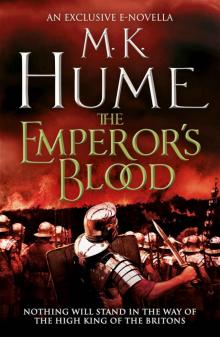 The Emperor's Blood (e-novella)
The Emperor's Blood (e-novella)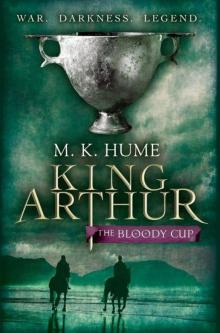 King Arthur: The Bloody Cup: Book Three
King Arthur: The Bloody Cup: Book Three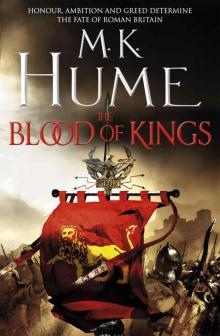 The Blood of Kings: Tintagel Book I
The Blood of Kings: Tintagel Book I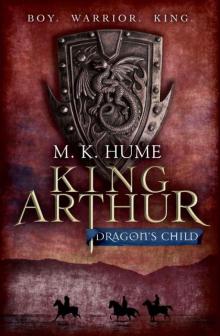 King Arthur: Dragon's Child: Book One (King Arthur Trilogy 1)
King Arthur: Dragon's Child: Book One (King Arthur Trilogy 1)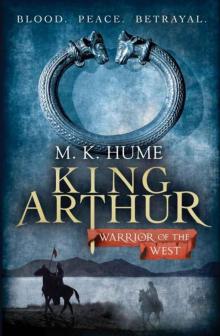 King Arthur: Warrior of the West: Book Two
King Arthur: Warrior of the West: Book Two The Storm Lord
The Storm Lord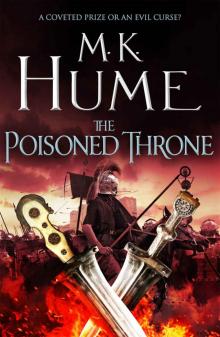 The Poisoned Throne: Tintagel Book II
The Poisoned Throne: Tintagel Book II![M. K. Hume [King Arthur Trilogy 04] The Last Dragon Read online](http://i1.bookreadfree.com/i2/04/07/m_k_hume_king_arthur_trilogy_04_the_last_dragon_preview.jpg) M. K. Hume [King Arthur Trilogy 04] The Last Dragon
M. K. Hume [King Arthur Trilogy 04] The Last Dragon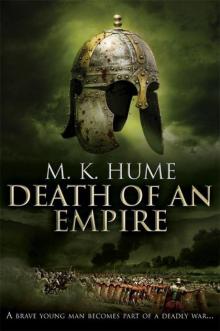 Prophecy: Death of an Empire: Book Two (Prophecy Trilogy)
Prophecy: Death of an Empire: Book Two (Prophecy Trilogy)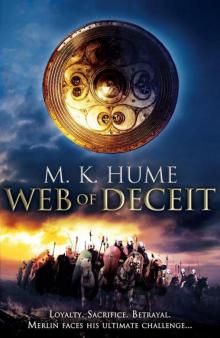 Prophecy: Web of Deceit (Prophecy 3)
Prophecy: Web of Deceit (Prophecy 3)